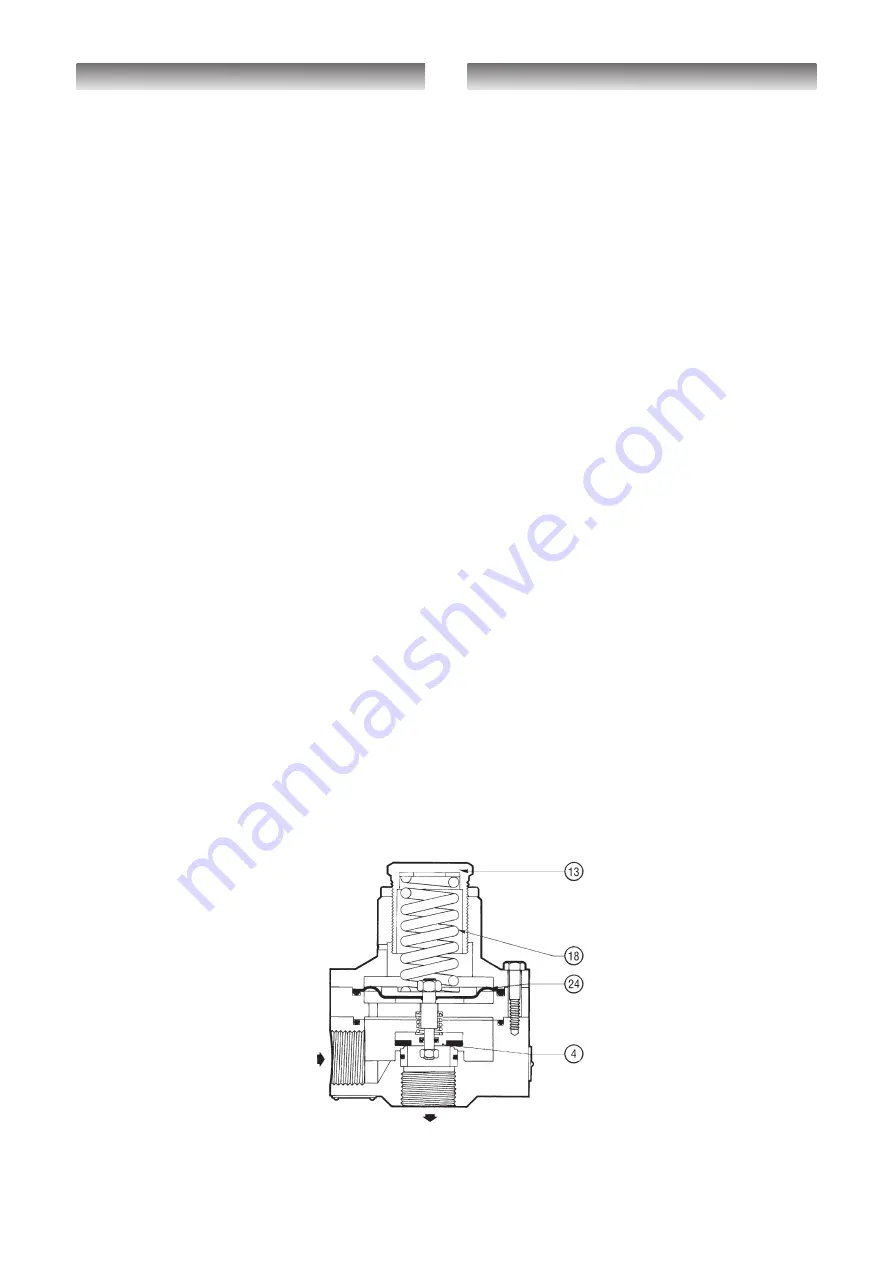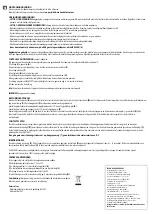
22
MANUALE TECNICO MT050
TECHNICAL MANUAL MT050
TECHNISCHES HANDBUCH MT050
3.0 ACCESSORI
3.0
ACCESSORIES
3.0
ZUBEHÖR
3.1
VALVOLA DI SFIORO
3.1
RELIEF VALVE
3.1
SICHERHEITSABBLASEVENTIL (SBV)
La valvola di sfioro è un dispositivo di
sicurezza che provvede a scaricare
all’esterno una certa quantità di gas quando
la pressione nel punto di controllo supera
quella di taratura a causa di eventi non
duraturi, quali per esempio, la chiusura di
valvole di intercettazione in un tempo molto
ridotto e/o un surriscaldamento del gas con
portata richiesta nulla. Lo scarico del gas
all’esterno può, per esempio ritardare o
evitare l’intervento del dispositivo di blocco
per cause transitorie derivanti da danni al
regolatore.
Ovviamente la quantità di gas scaricata
dipende dall’entità della sovrapressione
rispetto alla taratura. I diversi modelli di
valvole di sfioro disponibili si basano tutti
sullo stesso principio di funzionamento, che
viene in seguito illustrato facendo
riferimento alla valvola VS/AM 56 (fig. 4).
Esso si fonda sul confronto tra la spinta sulla
membrana 24 derivante dalla pressione del gas
da controllare e la spinta derivante dalla molla
di taratura 20. In questo confronto
intervengono il peso dell’equipaggio mobile, le
spinte statiche e quelle dinamiche residue
sull’otturatore 4.
Quando la spinta derivante dalla pressione del
gas supera quella della molla di taratura,
l’otturatore 4 viene sollevato con conseguente
scarico di una certa quantità di gas.
Non appena la pressione scende al di sotto
del valore di taratura, l’otturatore ritorna in
posizione di chiusura. Il controllo e la
registrazione dell’intervento della valvola di
sfioro può essere eseguito seguendo le
procedure di seguito indicate.
The relief valve is a safety device which
releases a certain quantity of gas to the
exterior when the pressure at the control
point exceeds the set-point as a result of
short-lasting events such as, for example,
the very fast closing of the on/off valves
and/or overheating of the gas with zero flow
rate demand. The release of the gas to the
exterior can, for example, delay or block
intervention of the slam-shut valve for
transitory reasons deriving from damage to
the regulator.
Obviously the quantity of gas released
depends on the extent of the overpressure
with respect to the set-point. The different
models of relief valve available are all based
on the same operating principle which is
illustrated below with reference to the valve
VS/AM 56 (fig. 4).
It is based on the contrast between the
thrust on the diaphragm 24 deriving from
the pressure of the gas to control and the
thrust from the setting spring 20. The
weight of the mobile assembly, the static
thrust and the residual dynamic thrust on
the obturator 4 also contribute to this
contrast.
When the thrust deriving from the pressure
of the gas exceeds that of the setting spring,
the obturator 4 is raised and a certain
quantity of gas is released as a result.
As soon as the pressure drops below the
set-point, the obturator returns to the closed
position. Proceed as indicated below to
control and adjust intervention of the relief
valve.
Das Abblaseventil dient als
Sicherheitsvorrichtung zum Schutz der
nachfolgenden Armaturen vor zu hohem
Druck, da beim Erreichen des
Einstellpunktes ein weiterer Druckanstieg in
der ausgangsseitigen Leitung vermieden
wird. Die Ursachen für einen solchen
Druckanstieg können sowohl das schnelle
Schließen von Absperrorganen und/oder
Erwärmung des Gases bei Nullabnahme
sein.
Das Ansprechen des SBV kann zum Beispiel
das Auslösen des oberen Schaltpunktes des
Sicherheitsabsperrventils am Regelgerät
verzögern oder verhindern.
Natürlich hängt die Menge des abgeblase-
nen Gases immer vom Druckanstieg und
dem eingeschlossenen Volumen ab.
Die verschiedenen zur Verfügung stehenden
Abblaseventil-Modelle VS/AM 56 beruhen
alle auf dem gleichen Funktionsprinzip.
Wenn die Kraft unter der
Vergleichermembrane 24 im Gleichgewicht
mit der Federkraft der Einstellfeder 20 steht,
dann ist der Ansprechpunkt erreicht, und
das Stellglied 4 beginnt zu öffnen.
Sobald der Druck unter den Einstellwert
sinkt, kehrt der Ventilteller wieder in die
Schließstellung zurück. Die Vorgehensweise
bei der Einstellung und Prüfung dieser
Sicherheitsabblaseventile wird in 3.1.1 und
3.1.2 beschrieben. Man unterscheidet fol-
gende Anordnungen:
Fig. 5
3.0 TILBEHØR
3.1
OVERTRYKSVENTIL
Overtryksventilen er en sikkerhedsanordning,
der frigiver en vis mængde gas, når trykket på
kontrolpunktet overstiger det indstillede tryk på grund
af ikke varige begivenheder, såsom for eksempel,
lukning af afspærringsventiler i meget kort tid og/eller
overophedning af gassen når der ikke er efterspørgsel.
Udledning af gas kan for eksempel forsinke eller
forhindre indgreb fra låsemekanismen når der er
tale om forbigående årsager, om følge af skader på
regulatoren.
Det er klart at omfanget af udledt gas afhænger af
omfanget af overtrykket i forhold til kalibreringen.
De forskellige tilgængelige overtryksventiler er alle
sammen baseret på det samme funktionsprincip, der
vil blive forklaret i det følgende med henvisning til
ventil VS/AM 56 (fig. 4).
Funktionsprincippet er baseret på kontrasten mellem
trykket på membranen 24 som følge af trykket fra
gassen der kontrolleres og trykket fra indstillingen
af fjederen 20. Vægten af det mobile udstyr samt
den statiske og dynamiske trykpåvirkning af
lukkemekanismen 4, spiller ind ved denne kontrast.
Når trykket fra gassen overstiger trykket for fjederen,
løfter lukkemekanismen 4 sig, med et deraf følgende
gasudslip.
Når trykket kommer under det indstillede tryk, vender
lukkemekanismen tilbage til lukket position. Kontrollen
med og registreringen af indgrebet fra overtryksventilen
kan udføres ved at følge procedurerne beskrevet i det
følgende.
3.0 ACCESSORIES
3.1
RELIEF VALVE
The relief valve is a safety device which releases a
certain quantity of gas to the exterior when the pressure
at the control point exceeds the set-point as a result
of short-lasting events such as, for example, the very
fast closing of the on/off valves and/or overheating
of the gas with zero flow rate demand. The release
of the gas to the exterior can, for example, delay or
block intervention of the slam-shut valve for transitory
reasons deriving from damage to the regulator.
Obviously the quantity of gas released depends on
the extent of the overpressure with respect to the set-
point. The different models of relief valve available
are all based on the same operating principle which
is illustrated below with reference to the valve VS/AM
56 (fig. 4).
It is based on the contrast between the thrust on the
diaphragm 24 deriving from the pressure of the gas to
control and the thrust from the setting spring 20. The
weight of the mobile assembly, the static thrust and
the residual dynamic thrust on the obturator 4 also
contribute to this contrast.
When the thrust deriving from the pressure of the gas
exceeds that of the setting spring, the obturator 4 is
raised and a certain quantity of gas is released as a
result.
As soon as the pressure drops below the set-point,
the obturator returns to the closed position. Proceed
as indicated below to control and adjust intervention
of the relief valve.
TEKNISK VEJLEDNING MT050
TECHNICAL MANUAL MT050
Fig. 5 /
Fig. 5
14
Summary of Contents for REFLUX 819
Page 84: ...NOTES NOTER NOTES ...
Page 85: ...NOTES NOTER NOTES ...















































